
AT THE EUROPEAN QUARTER OF BRUSSELS
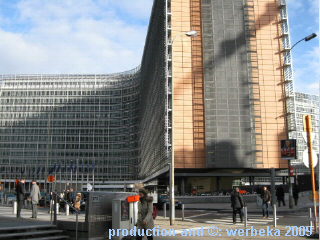 |
If you get off the Metro at the Station "Schuman" and ascend the staircases, you will suddenly find yourself in front of the Berlaymont-building, the juridical department of the European Commission in Brussels. The building is enormous, it is impossible to catch it on one photo or even at one glance. Immediately the question arises, how it can be possible to coordinate all those offices ... In spite of that, this is only one of the administrative buildings in the European Quarter of Brussels, a small part of the administration of the entire European Union.
|
|
And then there are more questions: Schuman? Berlaymont? Commission?
Robert Schuman is sometimes called the "father of the EU". That is why the Metrostation has been baptized after him. Furthermore he has here, in front of the Berlaymont, a memorial stone. He was, even if he was born in Luxembourg, French prime minister and foreign minister. As the latter he was an impellent force behind the European Coal and Steel Community, which in 1952 was founded by the Benelux, France, Italy and Germany. But Schuman's main thought was already then to create a European Community, in order to guarantee peace in Europe. Together with Jean Monnet he is seen as the mental initiator of a united Europe. |
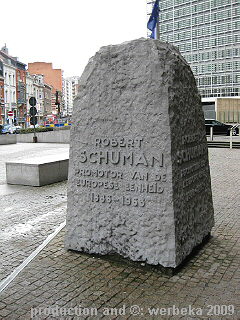 |
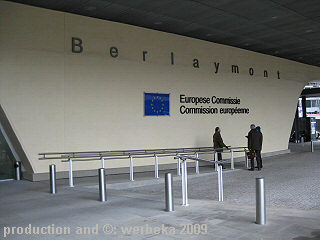 |
The name Berlaymont goes back to a school of the Augustinians. The "Ladies of Berlaymont" owned here a girls' school. When, between 1963 and 1967, the building was erected, the old name was adopted.
The European Commission shall carry out the decisions of the Council of Ministers and of the parliament. Besides, the Commission has the right to elaborate suggestions and to present them. The 27 commissioners (one for every member country) should be supranational and therefore observe the interests of the Community and not those of their national state. |
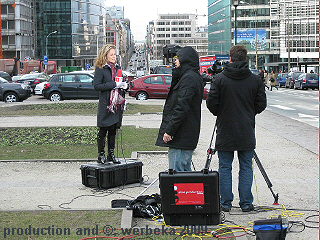 |
You can find reporterteams everywhere in this area, preparing a story for the news at home and having chosen one of the buildings as background. I have even seen a Spanish reporter, who all alone pointed her camera onto the Berlaymont and afterwards recorded her message.
In this case the team consists of three persons - in some way the scene reminds me of the soapboxspeakers in the Hyde Park in London. They have taken the building of the European Council as background and stand on the Wetstraat, or Rue de la Loi in French, which fittingly means "Street of the Law"...
|
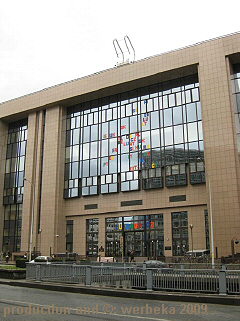 |
This street divides the Berlaymont from the House of the European Council. Chairmanship in the Council is changed every six months, in order to give the chairmanship in turn to all member states. The country, that holds the chairmanship, has also the right to decorate the entrance hall of this building. During the first half of 2009 it is the first time for the Czech Republic. |
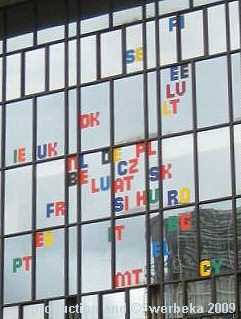 |
That the decoration wasn't the very best, because it was offending several countries, will probably be remembered, not at least in Bulgaria. But that the Czech neither are very good at European geography, the overview at the frontpanel shows clearly. To use the international abbreviations was a rather nice idea, but it would have been even nicer, had it been done correctly.
To place Portugal to the south-west of Spain might pass, but how can Malta be to the south-east of Italy? And Denmark to the north-east of Great Britain? But it would be a catastrophy to talk about the proportions in the north of Europe. Instead Luxembourg borders Austria ...
I don't want to complain just for the sake of complaining, but if one is representing all of Europe, then one could put down a little bigger effort on such bagatelles as well.
I fully understand, that it is necessary to have rigorous safety-controls for people, who enter such a building. This makes it inevitable, that handbags and other luggage must be scanned and that the visitors have to pass through a metal detector. But the system is not contributing to let the fellow citizen feel, that he or she is a part of this. |
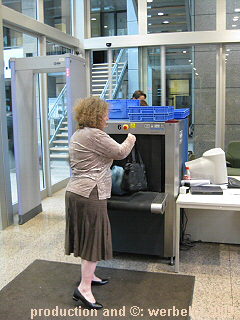 |
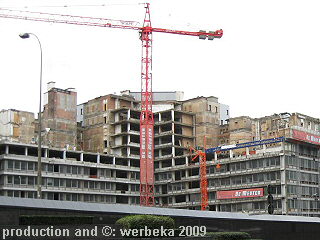 |
Next to the house of the Council there is a huge construction site. Of course the growing EU needs more and more space for its burocracy. Already in 1965 (within the European Community) 3200 employees of the Commission were working in eight different buildings around this quarter. Originally this area was called Leopold-quarter; it had been one of the first areas outside of the city walls of Brussels. But today the name has become European-quarter, because more and more large blocks of buildings are constructed, to be used by the EU. |
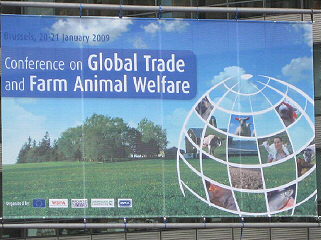 |
By the way, Brussels once had had the chance to unite all of the official organisations of the European Community within its borders, but that option was not used. This is why Strasbourg and Luxembourg today also are official seats of the EU. Another interesting fact is, that one here in Belgium (even officially) sees the EU as a normal continuation of the EC, whereas the newer member countries look at it as an independent organisation.
To arrange conferences and congresses is another part of the duties of the EU. |
The question, that arises in conjunction with this, is, if it really is necessary that the joint money is used for "Farm Animal Welfare" and the like. Please do understand that I like animals and of course they should not be harmed unnecessarily in any way - but this could be a question for the national governments, it is a bad idea to treat this on the highest level of the union. There must be more important questions.
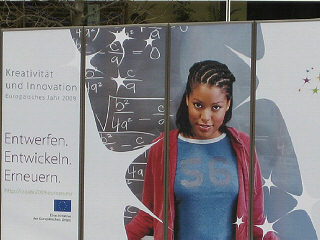 |
Another example where you could find the organisation questionable, is the European Year 2009, which is dedicated to creativity and innovation. Did you know about it? I did not. I am also convinced that the very most people within the EU don't have any idea about it. So much less, when the webpage about it, now, in the middle of March, still promises that the French, German, Spanish, Italian, Polish, Swedish and Czech version will appear shortly ... This is ridiculous. They should have been ready before the year started. |
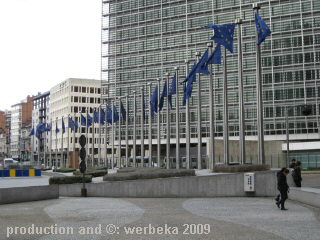 |
Even more so, as there is a competition, with a deadline March 31st - that meant, not even three weeks to go. This implies that the citizens have to know English, to be able to participate. By things like this it is only our money, that is wasted by some bunglars.
An when already complaining: in front of the Berlaymont there is the European flag with its 12 stars blowing in the wind. But - and I have counted several times, because I couldn't believe it - there blow 28 flags. But then I ask for which member country the 28th flag might be?
|
| Right next to the giant Berlaymont, on the other side of the street, as everywhere in the area, stand old buildings, many of them in Art Nouveau-style, which make a big contrast. And, if I shall be honest, then I must say that I prefer that old, natural environment - but I realize at the same time that times change. Today there are many restaurants in those old houses, in order to be able to serve the tourists, but surely even the deputies, dishes that they are used to from home. Between Spanish, Greek and Scandinavian restaurants one can drop into an English or Irish pub, and much more. |
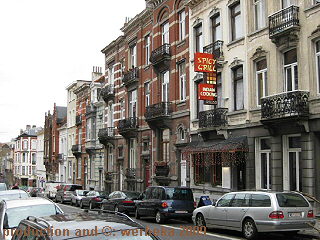 |
| Also hotels have marvellously adapted to those new conditions ... There are mainly single rooms and the prices for them are astronomical. A totally normal hotel in the vicinity asks 325 Euro for one night, but they have even a "Congress Rate" of 360 Euro. There are no doubles at all, but breakfast costs 21 Euro more. The participants of a congress will probably not be too unhappy about this, because for most of them we pay their expenses through their allowances.
My report might sound rather negative, as I see now, but actually I am in favour of the EU.
|
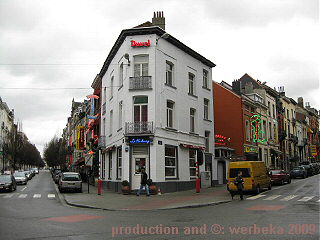 |
If you study European history, then you find a Hundred Years War and a Thirty Years War, but absolutely no Hundred Years Peace, barely thirty years of peace in all of Europe. Just the smaller risk for internal wars within the EU is worth a lot. Can we then, instead of indulging in nationalism, become Europeans in spite of our differences, then we have won even more. The Euro is, notwithstanding all complaints about increase in prices, a very important factor in favour of Europe on the global market. The inner market is certainly an advantage for the private industry and the open, intereuropean borders, as well as the right to live and work wherever you want, should be a basic condition in the 21st century.
If it furthermore would be possible to find a way to bring reasonable and thinking people into the leading clique, instead of today's many stubborn national politicians and unqualified bureaucrats, then we have come far ahead. If all of this leads to not spending the citizens money in unnecessary or even stupid projects, then we are close to Utopia. But it is still a long way to reach that far.
Copyright Bernhard Kauntz, Wolvertem 2009
Back to  or to the or to the  of of 
last update: 12.5.2009 by webmaster@werbeka.com
|















